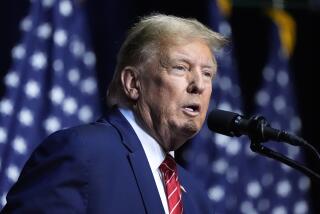Even as its kickoff, Trump’s reelection campaign aims to win without a majority
President Trump officially kicked off his reelection campaign this week with a rally in Orlando that, as Noah Bierman wrote, often resembled a “time warp” — a reprise of his slogans from 2016 and the grievances that have driven him ever since.
As he has throughout his presidency, Trump pitched his rally speech entirely to those who already back him. He has seldom appealed to voters in the middle, let alone to Democrats, and at the rally he didn’t pretend to.
Trump made his strategy explicit when reporters for Time magazine asked him in a recent interview if he thought he should reach out to swing voters.
“I think my base is so strong, I’m not sure that I have to do that,” Trump said.
Sign up for the Essential Politics newsletter »
LEVERAGING A MINORITY
The issue for Trump, of course, is that his base is, at best, about 4 in 10 voters.
His professed confidence that he can win a second term with them, alone, highlights a key fact about Trump’s campaign: It’s not designed primarily to win a majority of the vote.
That’s a unique approach in U.S. politics. It’s risky. But it just might work.
In 2016, Trump won the presidency despite getting almost 2.9 million fewer votes than Hillary Clinton. This time around, because of his deep unpopularity in large parts of the country, including California, his deficit could be significantly larger. Even in a victorious campaign, Trump might lose the popular vote by as much as 5 million votes, estimates Dave Wasserman of the nonpartisan Cook Political Report.
What matters for the outcome is Trump’s ability to hold onto his majority in the electoral college. That means the election likely will once again come down to a relative handful of votes in a few key states — Florida, Pennsylvania, Michigan and, the most likely tipping-point states, Wisconsin and Arizona.
Last time, out of more than 136 million votes cast nationwide, Trump became president by a margin of just 77,744 in Pennsylvania, Michigan and Wisconsin.
Turnout was high in that election; this time, it could be even bigger. Already, the share of voters who say they’re paying attention to the campaign has hit levels not typically seen until just before an election, as Marquette University polling expert Charles Franklin notes. Some experts, including professor Michael McDonald of the University of Florida, forecast that the turnout may break records that go back more than a century.
But the margin of victory for either side in the key states could easily be just as small as it was last time.
No person has ever won the presidency twice while losing the popular vote both times. What makes that scenario possible for Trump is that his coalition of voters, a combination of Republican regulars, social conservatives and blue-collar white voters, is distributed just about perfectly to get maximum mileage out of the state-by-state system by which the U.S. elects presidents.
Trump will lose California and New York by massive margins. Democrats may dramatically narrow his margin in Texas and Georgia. But none of that would change the result if he can hang onto Wisconsin and Arizona.
Even by that measure, Trump starts out well behind, as his campaign’s own polls show.
A month ago, Eli Stokols and Janet Hook reported that Trump campaign polls showed him losing in Pennsylvania. Subsequently, several news organizations reported additional internal polls showing Trump trailing in other swing states. He denied it, but his campaign later admitted the authenticity of the surveys, claiming only that they should be discounted because they were from earlier this spring.
The public polling tells a consistent tale. The latest USC Dornsife/LA Times poll, for example, found that nationwide, Trump trailed a generic Democratic candidate 51% to 37%. A Monmouth University poll released Thursday asked voters if Trump should be reelected or if it was time for someone new as president: Someone new won 59%-37%.
But do those numbers suggest doom for Trump’s reelection? No.
Trump won’t run against a generic Democrat or “someone new.” He’ll run against a specific opponent with a name and baggage of his or her own. In the current, hyperpartisan era of politics, the Democratic nominee, whoever he or she is, almost inevitably will become less popular as the campaign goes along. There’s already some sign of that happening with former Vice President Joe Biden.
The day before the rally, Trump highlighted one issue he hopes to run on, pledging that ICE would soon begin to deport “millions” — a pledge that officials discounted, although raids to arrest thousands are likely to take place in coming weeks.
At the rally, he made clear the themes he plans to stress: immigration, the issue that more than any other animates his most ardent supporters; abortion and the Supreme Court, to hold the loyalty of religious conservatives; and, regardless of who wins the Democratic contest, the accusation that the nominee represents an urban, coastal elite who “look down with hatred on our values and with utter disdain for the people whose lives they want to run.”
Trump’s gamble is that if the economy stays healthy, a campaign built on those themes will produce a big enough turnout among his core of older, white, conservative voters to carry him to reelection even if a majority of the county chooses someone else. He just might pull it off.
HURRYING ON DEREGULATION, JUST IN CASE
Trump’s appointees in key agencies are speeding ahead on deregulatory efforts. Their goal is to get new rules in place early enough so that court challenges can play out during the current term, insurance in case Trump doesn’t get a second one.
In the latest move, the EPA issued its new plan to gut a key Obama-era climate policy involving power plants. The move would bolster the coal industry, Anna Phillips wrote.
BACKING AWAY FROM WAR
For weeks, tensions between the U.S. and Iran escalated.
Sunday, the Pentagon accused Iran of shooting missiles at a U.S. surveillance drone, as David Cloud reported. On Monday, the administration announced plans to send 1,000 more troops to the region. On Thursday, officials said the Iranians had succeeded in shooting down a drone and threatened retaliation.
But, then, Trump abruptly changed the tone, dismissing the Iranian attack as a likely “mistake.”
“I find it hard to believe it was intentional,” he said — even though the Iranians, themselves, had said the opposite. Late Thursday night, Trump canceled a planned retaliatory strike, tweeting Friday morning that a U.S. general had told him the attack might kill as many as 150 Iranians.
As Bierman and Eli Stokols reported, Trump’s actions contradict his bellicose rhetoric — and the preferences of the hawkish advisers he’s hired — but they’re consistent with his long-standing positions.
The president is, at heart, an isolationist, opposed to U.S. military involvement overseas unless the U.S. is directly attacked. In Iran, as with North Korea, he’s inverted Teddy Roosevelt’s dictum — speaking very loudly, but keeping the stick locked up.
That approach drives much of the foreign policy establishment crazy, but politically, it almost surely beats another Mideast war.
Meanwhile, amid the complex maneuverings, the administration still lacks a Defense secretary. Trump’s acting secretary, Patrick Shanahan, abruptly resigned Tuesday as news became public of a history of violence in his family, mostly involving his ex-wife and son, Cloud wrote.
The Pentagon has been without a confirmed secretary since James Mattis resigned in December — an unprecedented period of vacancy at the top. Trump named Secretary of the Army Mark Esper to take over as acting secretary of Defense, but it’s uncertain when he’ll nominate a permanent secretary.
BIDEN NOSTALGIA DRAWS FIRE
Biden has made a major point of his ability to cut legislative deals. As Janet Hook wrote, that theme was already drawing critiques in recent days from liberals, who say that many of Biden’s deals during President Obama’s tenure gave up too much to the GOP.
Then, Biden kicked the controversy up several notches with a nostalgic remark about his work with segregationist senators James Eastland of Mississippi and Herman Talmadge of Georgia.
Look for that topic to get attention next week, when the Democrats meet for their first primary debate. For all of the candidates, there’s a lot at stake.
PRE-DEBATE, CANDIDATES LAY OUT POLICIES
For Gov. Jay Inslee of Washington, the number one issue is climate change. He’s cast his campaign as an effort to save the planet, Matt Pearce wrote.
Julian Castro, who was Obama’s Housing secretary, set out a plan this week for a surge in federal spending to end homelessness.
Sen. Cory Booker released a new plan to offer clemency to thousands of nonviolent drug offenders, a major step toward reducing incarceration, as Evan Halper wrote.
On a similar topic, Sen. Elizabeth Warren released a plan for a ban on private prisons and detention centers, joining Sens. Kamala Harris and Bernie Sanders on that issue.
And at least one 2020 hopeful had to walk back what appeared to be a policy statement: Marianne Williamson apologized for calling vaccine mandates “Orwellian.”
BUT VOTERS STILL STRESS ELECTABILITY
Our latest USC Dornsife/LA Times poll asked voters who plan to participate in the Democratic primaries to tell us what they envisioned as the generic candidate most likely to beat Trump. What did they come up with? A middle-aged white man with extensive political experience.
PRESCRIPTION DRUGS FOR $11?
U.S. policymakers don’t like to look overseas for models. But on healthcare, they might want to examine Germany, Noam Levey wrote. German patients get the latest drugs for just $11. Read Levey’s story to see how the German model works and how it might apply to the U.S.
DEMOCRATIC FRUSTRATION GROWS
Democrats summoned Hope Hicks, Trump’s former communications director, to the House Judiciary Committee, asking her to spill the beans on Trump. She didn’t, although a transcript did later show that she defended the Trump campaign’s use of Democrats’ hacked emails.
As the White House continues to block witnesses from appearing or, in Hicks’ case, severely limits their testimony, Democratic support for starting an impeachment proceeding grows. This week, Rep. Katie Porter of Irvine announced her support for an impeachment inquiry
SUPREME COURT PUNTS
The Supreme Court is down to the final weeks of its term and, so far, has sidestepped several big controversies.
The justices passed, for now, on a new wedding cake dispute — a case that would have again pitted gay rights against the religious beliefs of conservatives, as David Savage wrote.
The court also said that a 40-foot cross can stand on public land as a war memorial. The decision essentially said that religious monuments that have been around for a long time should get a pass, but suggested that newly established monuments might not.
Friday, the court reversed the conviction of a black man in Mississippi who had been tried six times for the murder of four people in a furniture store. The prosecutor had systematically excluded all but one black juror from any of the trials.
But as Savage wrote, the court avoided any broad, new statement about racial discrimination in jury selection.
FEDERAL RESERVE DOES LIKEWISE
Federal Reserve policymakers have been under intense pressure from Trump to cut interest rates, as Don Lee wrote. They decided, for now, to hold interest rates steady, but indicated that a rate cut was likely in the near future if the economy continues to show signs of weakening.
NUNES’ TIGHT CIRCLE
Rep. Devin Nunes of Tulare had the toughest reelection of his career in 2018. In an unusual move, he hired a longtime supporter with little experience to handle the key campaign job of placing ad buys. Sarah Wire took a close look. It’s an intriguing example of how Nunes operates.
LOGISTICS
That wraps up this week. Until next time, keep track of all the developments in national politics and the Trump administration at our Politics page and on Twitter @latimespolitics.
Send your comments, suggestions and news tips to politics@latimes.com.
If you like this newsletter, tell your friends to sign up.
More to Read
Get the L.A. Times Politics newsletter
Deeply reported insights into legislation, politics and policy from Sacramento, Washington and beyond. In your inbox three times per week.
You may occasionally receive promotional content from the Los Angeles Times.











